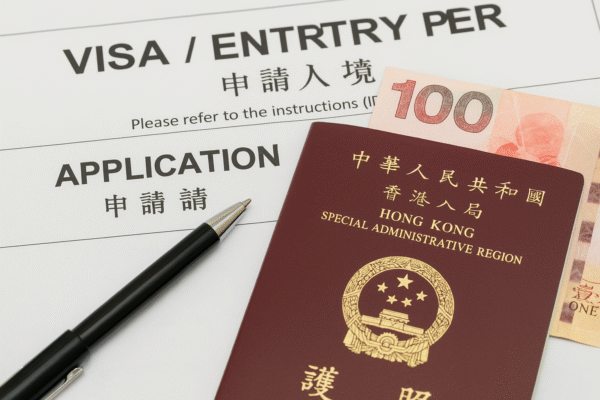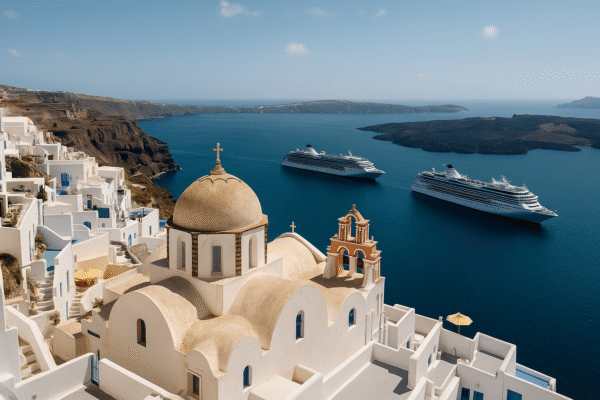Greece Introduces £17 Cruise Tax for Tourists Visiting Mykonos and Santorini Starting July 2025
Greece is taking a bold step to combat the negative impacts of overtourism by introducing a new seasonal cruise passenger tax, effective from July 21, 2025. Tourists arriving via cruise ships to some of the country’s most overburdened destinations—such as Mykonos and Santorini—will now pay €20 (around £17) per visit. This policy is part of a wider strategy to manage tourist overcrowding, support local infrastructure, and ensure a more sustainable future for Greece’s island communities.
The cruise tax will vary depending on the season and destination. Passengers docking at high-traffic ports like Santorini and Mykonos will face the highest charges during the summer peak, while those visiting lesser-known ports will pay €5 (approx. £4.31). As the high season draws to a close, the charges will gradually drop:
- Shoulder season (April, May, October): €12 (£10) at major ports; €4 (£3.43) elsewhere
- Low season (November to March): €4 (£3.43) at major ports; €1 (around 86p) elsewhere
This new taxation model mirrors recent strategies employed in other overtourism-hit European destinations like Venice, Barcelona, and Amsterdam, where visitor levies are being used to regulate tourist flows and fund infrastructure improvements.
Why Is Greece Introducing These Tourism Taxes?
The Greek Ministry of Tourism has cited the unsustainable volume of cruise arrivals—particularly during summer months—as a pressing issue for small island communities. In 2023 alone, Greece welcomed 40.7 million international tourists, a 12.8% increase from the previous year, generating €21.6 billion in revenue (approximately £18.6 billion). However, this economic success has come at a steep cost.
Residents of islands like Santorini, known for its cliffside villages and iconic sunsets, and Mykonos, famous for its beaches and nightlife, have long complained of strained public services. Local water supplies, waste systems, and transport infrastructure struggle to cope with thousands of cruise passengers disembarking for just a few hours at a time. Narrow alleyways become gridlocked, and prices for goods and housing continue to rise, often leaving locals priced out of their own communities.
The newly implemented cruise tax seeks to redistribute tourism flows more evenly throughout the year and the country. According to Greece’s Deputy Minister of Tourism, the government hopes to incentivize off-season travel while funding upgrades to municipal services and preserving the environment. A portion of the revenue will also be reinvested in less-visited Greek regions, promoting a more balanced tourism economy.
Hotel and Accommodation Taxes Remain in Effect
In addition to the new cruise tax, Greece’s longstanding accommodation tax will continue to apply across all types of lodging. Tourists staying in hotels, guesthouses, or holiday rentals pay a nightly fee based on the star rating or classification of the accommodation:
- €0.50 (43p) for lower-tier lodging
- €4 (£3.45) per night for five-star hotels
A one-week stay in a luxury hotel could therefore see guests paying €28 (around £24.13) in additional taxes. This fee is usually charged at check-out or included in the total booking cost.
Impact on UK Tourists
British travellers, among the largest groups of international visitors to Greece, are particularly advised to factor in these new and existing charges when planning 2025 holidays. Travel agents and cruise operators are expected to clarify whether these fees are prepaid or payable upon arrival.
According to the UK Foreign, Commonwealth & Development Office (FCDO), visitors are encouraged to review terms and conditions of bookings, especially for cruises, as some carriers may incorporate the cruise tax into ticket prices, while others may collect it onboard or onshore.
Moving Towards Sustainable Travel in the Aegean
Greece’s tourism authorities are placing sustainability at the heart of long-term planning. Initiatives include limiting the number of daily cruise ship arrivals, promoting eco-conscious travel experiences, and strengthening waste and water management systems on its most visited islands. Additionally, the Greek government is partnering with the European Commission and UNWTO (World Tourism Organization) to develop island resilience programs focused on climate adaptation and cultural preservation.
In Santorini, local authorities are already piloting a “smart tourism” app, offering real-time updates on crowd density, sunset viewpoints, and alternative routes to avoid congestion. In Mykonos, waste disposal systems are being upgraded to reduce marine pollution caused by cruise activities.
A New Era for Greek Island Tourism
While the new cruise tax may add a modest cost to visiting Greece, the long-term goal is to create a healthier balance between tourism and local life. As international travel demand continues to rise post-pandemic, the country is shifting away from high-volume mass tourism toward a higher-value, lower-impact model.
Travellers who visit Greece in 2025 will not only enjoy its world-renowned beauty and hospitality but will also contribute directly to preserving the nation’s natural and cultural heritage. This transformation signals a pivotal moment for Greek tourism—one where sustainability and local wellbeing are finally being prioritized.
For more travel news like this, keep reading Global Travel Wire















